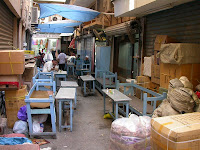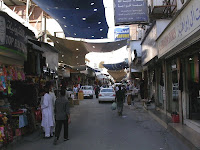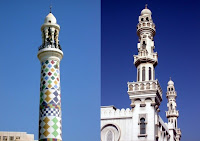Entre 2009 y 2010
Ya llevo de vuelta en España casi un mes. No he estado todo el tiempo en mi ciudad natal. Fui a Madrid a pasar allí unos días con un excelente amigo y quedar con otro buen amigo. Lo pasé muy bien visitando museos, viendo la ciudad y comiendo un montón de buena comida española... El plan perfecto. Luego volví a casa porque tenía la visita de un amigo que venía de Londres a pasar una semana. He disfrutado mucho enseñándole el País Vasco. Pasamos algunos días en Vitoria-Gasteiz y algunos más en Bilbao. Ha estado genial ya que él ha sido el primer amigo en venir a visitarme de los que he conocido desde que empecé a vivir en el extranjero. Aún tengo algunos días o posiblemente semanas más aquí para quedar con 'amigos locales'. No sé todavía cuándo me voy pero debería ser en algún momento en Enero. Ya sabes, de vuelta a Oriente Medio.
El año termina y voy a hacer una pequeña revisión como hice el año pasado. Bueno, en resumen: ¡ha sido una mierda! He tenido cosas buenas, por supuesto. He seguido conociendo gente estupenda, eso es siempre lo mejor de cada año, de cada día que vivo. También me gustó el irme a Manchester, el momento y las razones por las que lo hice. Un buen amigo me dijo una vez que lo importante no es el destino, sino lo que te lleva hasta él. Me encanta esta frase y es uno de mis lemas. Este movimiento ha sido una de las claves del año yo creo. Y para casi terminar 2009, he pasado 2 meses trabajando en el Golfo Pérsico. En este caso, sin embargo, era más el destino que las razones que me condujeron allí. Disfruté mucho pero no era lo que estaba esperando ni lo que quería en mi vida en ese momento (no debería quejarme, he tenido suerte después de todo, lo sé...)
De todas formas, sólo un buen humor general cuya fuente me es desconocida me ha mantenido en un buen espíritu y bastante optimista o no demasiado depre durante la mayor parte del año. He tenido razones para estar triste e incluso desesperado. El año empezó con algunos problemas de salud y con la mala noticia de los despidos, a los que finalmente me presté voluntario. Dejar el trabajo, mis amigos y todo detrás de nuevo en el Sureste de Inglaterra fue doloroso a pesar de que pensé que era el momento justo de hacerlo. La búsqueda de trabajo en Manchester fue muy dura y casi tuve que dejarlo por imposible... Podía haber tenido un trabajo pero no esperé y acepté el de Bahrein en su lugar. La experiencia allí fue buena pero me vi forzado a dejar el lugar que había elegido para asentarme. Eso fue malo y me dejó con sensación de fracaso.
Ahora 2010 empieza con la misma incertidumbre que 2009 dejó. Probablemente vuelvo al Golfo Pérsico para más tiempo que la última vez. No me muero de ganas de ir pero una vez allí creo que me gustará. El dinero es mi razón principal para ir allí y eso no es una buena señal. Ya sé que la mayoría de gente trabaja por dinero pero yo no lo había hecho nunca y siempre había algo que me motivaba más. Bueno, pues no es así esta vez. Soy un mercenario de la arqueología... Después de que termine el proyecto, no tengo planes, ni ideas, ni objetivos. Puede que vengan más proyectos. Puede que haga un nuevo intento de asentarme en el Reino Unido y ver si esta vez encuentro un trabajo normal que me pague las facturas. También estoy pensando en un viaje cuando junte mi dinero para ver si me lo puedo permitir. Ya veré.
Me temo que esto es todo lo que tengo que decir. Bastante mal 2009 y vacío por delante para 2010. Deséame suerte, podría necesitarla. Ven conmigo, podría necesitarte.













































